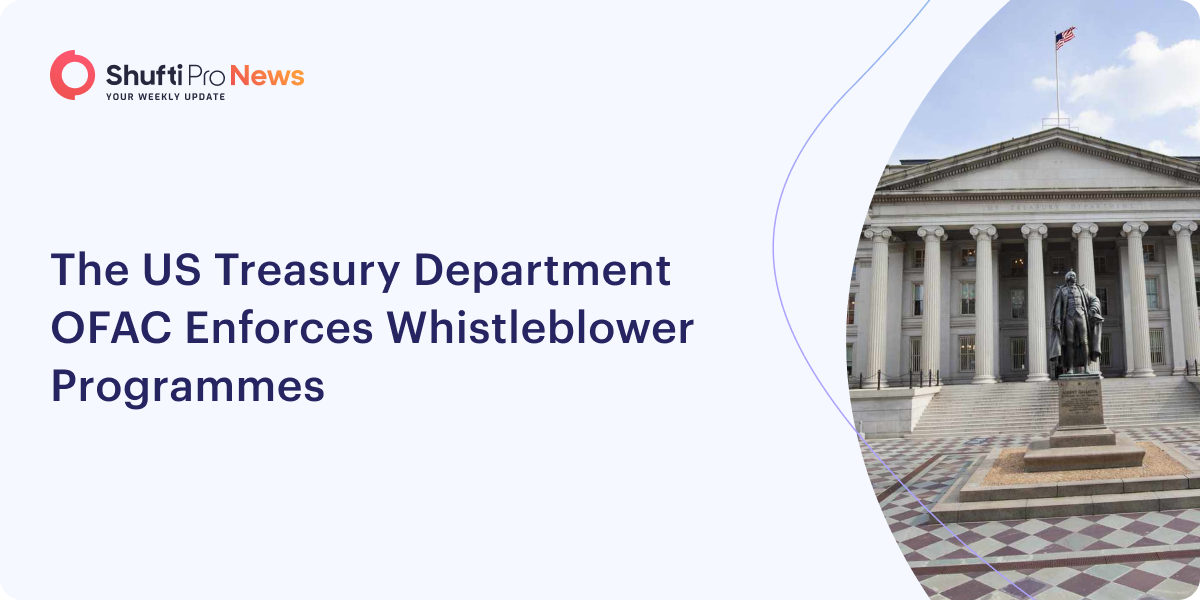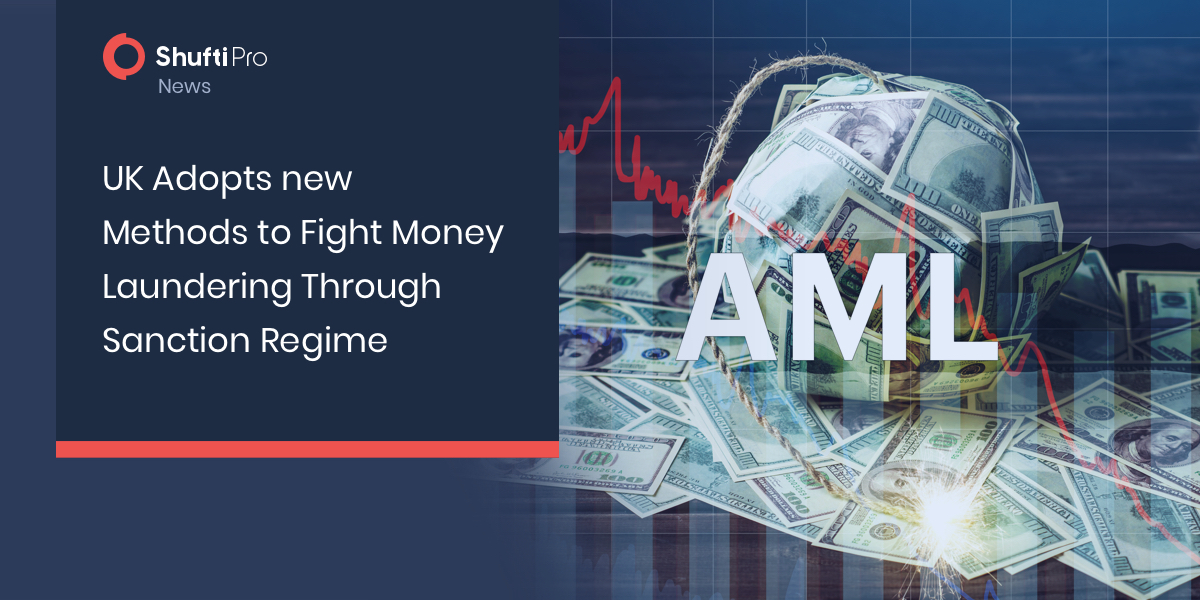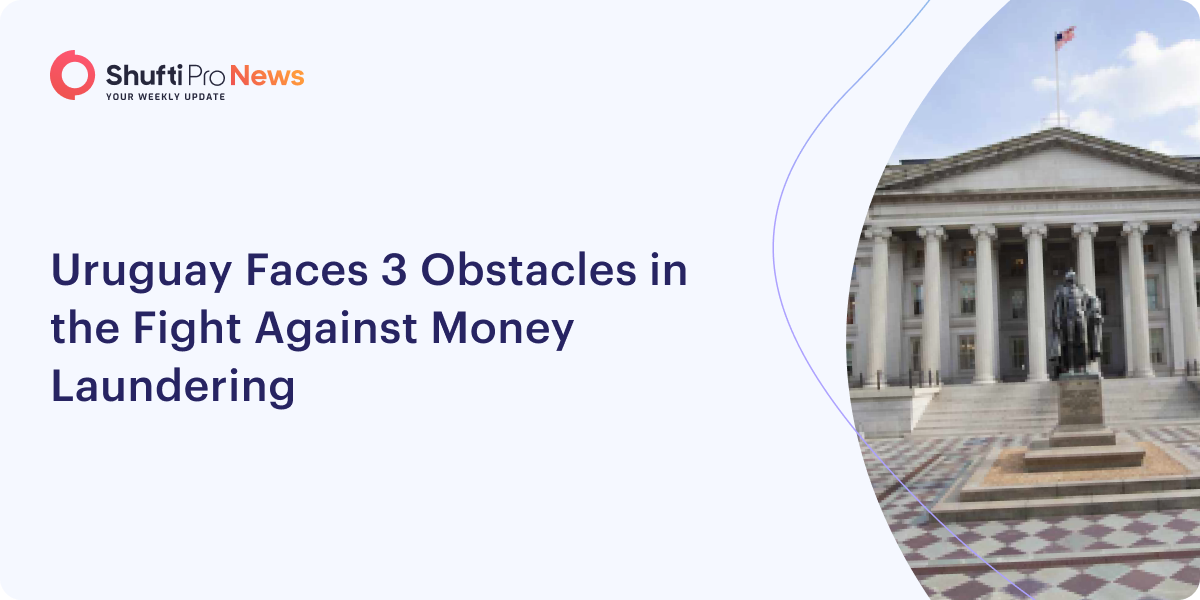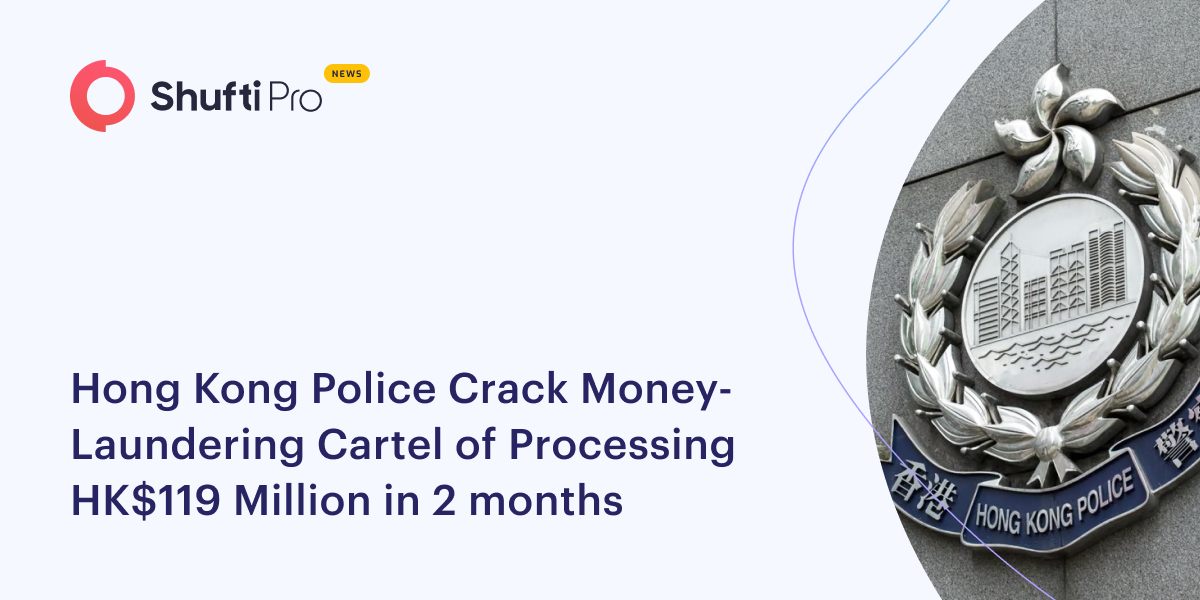News
UAE Firms Must Disclose UBO’s to Avoid Dirty Money Watch List
500,000+ firms in the UAE (United Arab Emirates) face disclosure of their Ultimate Beneficial Own...
 Explore More
Explore More
News
EUR 27 Million Worth Crypto Assets Seized by the NCA in Money Laundering Crackdown
NCA seizes crypto assets worth £27m last year in a major money laundering crackdown
Although inst...
 Explore More
Explore More
News
One-third of Finance Firms Have Accelerated Use of AI to Detect Money Laundering
Financial institutions are heavily investing in Artificial Intelligence (AI) and Machine Learning...
 Explore More
Explore More
News
UK FCA Orders Illegal Crypto Service Providers to Shut Down ATMs
The UK’s Financial Conduct Authority has ordered crypto firms operating illegally in the country ...
 Explore More
Explore More
News
Council of Europe Shows Support to Serbian Authorities For Combating Money Laundering
The Council of Europe stays dedicated to showing support to authorities for fighting money-launde...
 Explore More
Explore More
News
Coronavirus affects challenger banks as app downloads decline
According to Finbold, top challenger banks in the United Kingdom have noticed a sudden decline in...
 Explore More
Explore More
News
Morocco’s Parliament Unanimously Approves the Bill to Amend AML Regulations
The House of Representatives of Morocco has unanimously agreed to pass the bill to amend the anti...
 Explore More
Explore More
News
FATF Highlights the Gaps in New Zealand’s AML Measures
Financial Action Task Force (FATF) has issued a report on New Zealand’s measures to combat money ...
 Explore More
Explore More
News
UAE Authorities to Coordinate Efforts Against ML/TF Among NPOs
The UAE’s Ministry of Community Development and the Financial Intelligence Unit have established ...
 Explore More
Explore More
News
Australian Government Announces Development of Gambling Regulations Commission
Australian spokespersons for Gambling and Harm Reduction forced the New South Wales (NSW) governm...
 Explore More
Explore More
News
Australian Government to Extend AML and CTF Regime
The Australian Government has initiated a consultation on revising the Anti-Money Laundering (AML...
 Explore More
Explore More
News
Facebook affirms Libra commitment with new job openings
According to the Irish Times. Facebook is planning to hire 50 people for its payment app Calibra ...
 Explore More
Explore More
News
Nexo to Sue Bulgarian State over Money Laundering Allegations
The Bulgarian crypto lending bank, Nexo, revealed that it would file legal action against the Bul...
 Explore More
Explore More
News
5 Billion Unique Credentials Circulating on Darknet
According to the report released by security firm Digital Shadows, a total of 15 billion user cre...
 Explore More
Explore More
News
BSA-AML Compliance Group Disclose Names of Annual Gaming Conference Speakers
The BSA-AML Compliance group has revealed the names of the speakers attending the annual gaming c...
 Explore More
Explore More
News
EUR 27 Million Worth Crypto Assets Seized by the NCA in Money Laundering Crackdown
NCA seizes crypto assets worth £27m last year in a major money laundering crackdown
Although inst...
 Explore More
Explore More
News
Hong Kong Police Reveals 822 Romance Scams Occurred in 1H of 2021
The Hong Kong Police has advised the public to remain cautious when meeting people online due to ...
 Explore More
Explore More
News
Australian Bank, Westpac, Accused of 23 Million Money Laundering Breaches
Australia’s financial intelligence agency, The Australian Transaction Reports and Analysis Centre...
 Explore More
Explore More
News
Italian Regulators Block Consumers from Investing in Binance
Italy has joined the list of warnings against Binance, directing citizens to avoid investing in t...
 Explore More
Explore More
News
Investment platforms on target of Criminals to Launder Stolen COVID Relief funds
Sophisticated fraudsters with expert knowledge in tech are stealing the COVID-19 relief funds fro...
 Explore More
Explore More
News
South Korea’s Largest Crypto Exchange Upbit Registers with KoFIU for AML
Upbit is reportedly the first South Korean crypto exchange to register the Korean Financial Intel...
 Explore More
Explore More
News
Jamaican Senate Approves Order to Combat Money Laundering
The Jamaican Senate recently approved the Proceeds of Crime (DNFBPs)(TCSPs) Order, 2022, which is...
 Explore More
Explore More
News
UK Approves New Age Verification Laws to Protect Children
The UK government approved the “Online Safety Bill,” which contains measures to protect children ...
 Explore More
Explore More
News
The US Treasury Department OFAC Enforces Whistleblower Programmes
According to the US Treasury’s Department Office of Foreign Assets Control (OFAC), companies must...
 Explore More
Explore More
News
The IRS Issues Last Minute-Warning To Avoid Tax Penalties
A new warning has been issued by the IRS with the introduction of an identity protection pin that...
 Explore More
Explore More
News
Ontario’s Casinos Need to Strengthen Efforts to Curb Money Laundering
According to Auditor General Bonnie Lysyk, Ontario’s casinos need to strengthen efforts in order ...
 Explore More
Explore More
News
Bitcoin ATMs face stricter regulations over money laundering
According to experts, Bitcoin ATMs (BATMs) will face stern regulations globally, with countries s...
 Explore More
Explore More
News
IMF Joins Hands with Philippines on Wholesale CBDC Project
IMF has announced the collaboration with BSP (Bangko Sentral ng Pilipinas) for the development of...
 Explore More
Explore More
News
Financial Crimes Surged Amid COVID-19, Says FATF
Financial Action Task Force (FATF) speaks up about the adverse effects of COVID-19 on financial r...
 Explore More
Explore More
News
Rabobank’s Profits Drop Over Shut Down in Russia and Increased AML Costs
Dutch Cooperative Rabobank revealed that its profit plunged more than a quarter in the first half...
 Explore More
Explore More
News
Pakistan Launches Contactless Biometric Verification for Banking
Pakistan has become one of the first countries in the world to implement biometric verification t...
 Explore More
Explore More
News
11 Arrested for Illegal Offshore and Cross-Border Gambling Activities in Macau
11 people arrested along with businessman Alvin Chau in an investigation of bogus gambling scheme...
 Explore More
Explore More
News
AMLA Adds New Protections and Financial Incentives for US Whistleblowers
Anti Money Laundering Act 2020, has amended the recently enacted AML whistleblower improvement ac...
 Explore More
Explore More
News
Ransomware attack targets Victoria Beckham’s personal data
Maze, the Ransomware gang strikes again. It seems that the victim this time is a US-based indepen...
 Explore More
Explore More
News
Crown Casinos Fined $450 Million for AML Failures
Casino operator Crown should pay a fine of $450 million for 546 violations of anti-money launderi...
 Explore More
Explore More
News
Swedish Gaming Authority Fines Kindred, ATG, and PinBet for AML Failures
Swedish gaming authority has fined Kindred, ATG, and PinBet £1.4m, €1.7m, and $1.8m, respectively...
 Explore More
Explore More
News
Swiss Prosecutor Identifies Trail to Credit Suisse Money Laundering Case
A Swiss Prosecutor has identified the trail leading to the Credit Suisse money laundering case wo...
 Explore More
Explore More
News
BitGo settles with US Treasury; Sanctions Violations will Cost $98,830
The U.S. Treasury has settled with BitGo over costs that it helped users in authorised divisions ...
 Explore More
Explore More
News
FATF issues new guidance on Digital Identity systems
A guidance paper has been issued by the Financial Action Task Force (FATF) to assist governments,...
 Explore More
Explore More
News
Despite the Concerns, Arizona Bans Vaccine Passports for Government
Governor of Arizona, Doug Ducey has restricted the local and state government agencies from askin...
 Explore More
Explore More
News
El Salvador Must Address Bitcoin’s Risks, Demands IMF
The IMF has urged El Salvador to address the risk associated with the adoption of bitcoin as a le...
 Explore More
Explore More
News
State Street Bank fined $1.24 million for breaching AML laws
The US-based State Street bank has been hit with million-dollar money laundering fine. The Austra...
 Explore More
Explore More
News
Biden Going After Crypto Tax Evaders with Data Sharing Initiative
President Biden’s administration is proposing global cooperation to curb the threat of crypto-rel...
 Explore More
Explore More
News
House Bill Passed in Philippine to Enforce AML LAW
House of Representatives has approved legal amendments to regulate the developers, metal dealers,...
 Explore More
Explore More
News
UK Adopts new Methods to Fight Money Laundering Through Sanction Regime
The UK declared a new sanction regime against financial crimes like money laundering. According t...
 Explore More
Explore More
News
Sri Lanka removed from the high-risk money-laundering list
COLOMBO – Sri Lanka was recently removed from the list of high-risk countries for money lau...
 Explore More
Explore More
News
Govt assists Struggling Swiss Crypto Valley
Switzerland’s “Crypto Valley” is in talks with the federal government for fixing a 100 million Sw...
 Explore More
Explore More
News
UAE Deploys Hi-Tech Measures to Combat Money Laundering
The UAE has intensified its measures in the fight against money laundering and terrorism financin...
 Explore More
Explore More
News
AUSTRAC Warns Banks Against Closing Accounts of Crypto Traders
AUSTRAC shows full support for the Australian crypto industry and is issuing warnings to banks ag...
 Explore More
Explore More
News
Nigerian House of Representatives Pledges Strict Regulations Against Money Laundering and Terrorism Financing
The Nigerian House of Representatives Committee on Financial Crimes stated they would design stri...
 Explore More
Explore More
News
EU to Disclose the Names of the Non-Compliant Banks
EBA, The European Banking Authority is setting up a database to highlight the names of banks and ...
 Explore More
Explore More
News
Uruguay Faces 3 Obstacles in the Fight Against Money Laundering
Uruguay’s national secretariat unit, SENACLAFT, revealed three obstacles in fighting money launde...
 Explore More
Explore More
News
British Columbia Makes Regulatory Change to Combat Money Laundering
The British Columbia government is providing the gambling regulator of the province more independ...
 Explore More
Explore More
News
FBI Expands its Corruption Unit to Closely Monitor Illicit Activities
The Federal Bureau of Investigation (FBI) has stepped in, to monitor international corruption by ...
 Explore More
Explore More
News
Crypto Mixers, Helix and Coin Ninja, Fined by FinCEN for Bank Secrecy Act Violation
Larry Dean Harmon, founder of Helix and Coin Ninja, has been fined $60 million for being involved...
 Explore More
Explore More
News
“Online Trading Platforms to Become a New Hub for Investment Scams” Warns FCA
FCA warns that investment scams are increasing in the UK via online means of trading platforms an...
 Explore More
Explore More
News
Brace for Home Visits, FCA Warns Remote Traders and Bankers
UK’s Financial Conduct Authority has issued a warning for all hybrid-working financial institutio...
 Explore More
Explore More
News
Dutch Court Rules Out Duties Imposed by National Bank on Crypto Platforms
The Dutch District Court ruled out all National Bank’s duties on the crypto platforms by stating ...
 Explore More
Explore More
News
Mass Stablecoin Adoption Could Assist Financial Crime – Says FATF
FATF suggests nations and financial service providers should identify potential risks of cryptocu...
 Explore More
Explore More
News
Global Plight: Australia Paves the Way for Money Laundering in the Property
Australia facilitates money laundering through the property, causing a global plight and perpetua...
 Explore More
Explore More
News
UN Warns of Increased Money Laundering Risk from Mekong Casinos
The UN officials claimed transnational criminal gangs are exploiting Southeast Asia’s gaming and ...
 Explore More
Explore More
News
Credit Cards are Risky for Crypto Transactions, Says Taiwan’s Financial Watchdog
Credit cards should not be used for crypto-related transactions, as stated by Taiwan’s financial ...
 Explore More
Explore More
News
Ireland Mandates Registration of Crypto Firms Under AML Laws
Ireland has taken new measures to regulate crypto businesses under the AML law for the first time...
 Explore More
Explore More
News
Hong-Kong Police Crack money-laundering Cartel of Processing HK$119 Million in 2 months
Hong Kong police have rounded up 11 men in a crackdown on a cross-border syndicate with a suspect...
 Explore More
Explore More
News
UK’s AML Regulations for Art Market Excludes Art Creators
The UK to implement new Anti-Money Laundering regulation to cover the art market from 10th June 2...
 Explore More
Explore More
News
UK and UAE Take Steps in Joint Efforts to Combat Money Laundering
In the UAE-UK Partnership to Tackle Illicit Financial Flows, the two countries are in talks about...
 Explore More
Explore More
News
Experts Warn that Scammers are Exploiting EU Users on Meta’s Threads
Meta’s Threads app has become the newest platform for cyber scammers to commit identity theft, cr...
 Explore More
Explore More
News
Lithuanian Government Approves Amendment to Strengthen Digital Currency Regulations
Lithuania is on the verge of becoming the first country in Europe to pass strict laws on digital ...
 Explore More
Explore More
News
Nearly $30 Billion Laundered Through Canada’s Real Estate – Says TIC
A joint study by Transparency International Canada and the End Snow Washing Coalition highlighted...
 Explore More
Explore More
News
Swedbank Estonia Reports High-Risk Client for Laundering $2 Billion
Swedbank Estonia labeled one of its clients a “high-risk” company due to suspicious transactions ...
 Explore More
Explore More
News
Star Casino’s Share Tumbles 21% Following Money Laundering Allegations
Individuals banned from gambling at the Star casino in Sydney had been permitted to gamble at Sta...
 Explore More
Explore More
News
Myanmar Promises Improvements after FATF’s Blacklisting
Myanmar’s central bank has made promises of reforms and issued a warning against currency m...
 Explore More
Explore More











































































